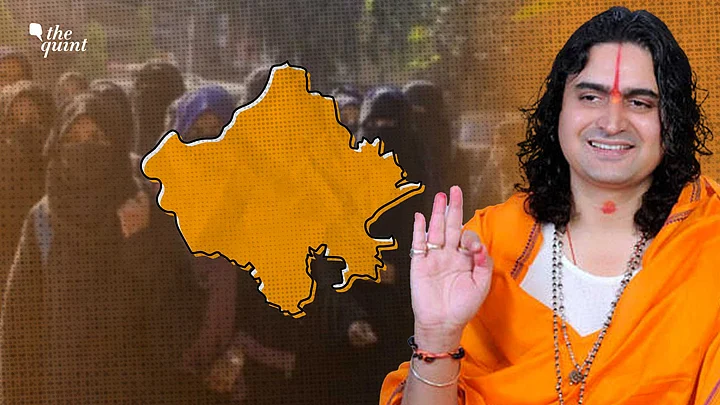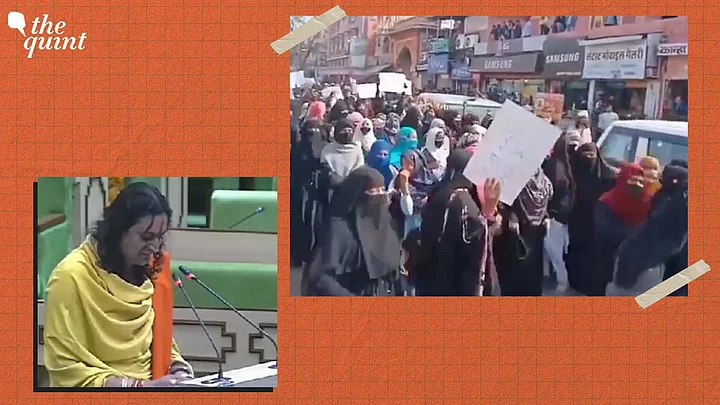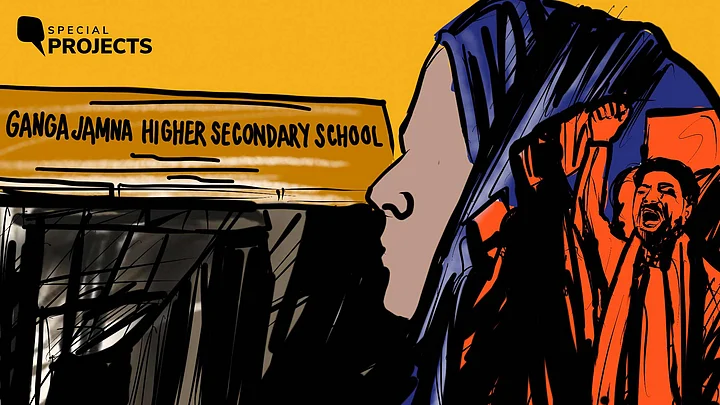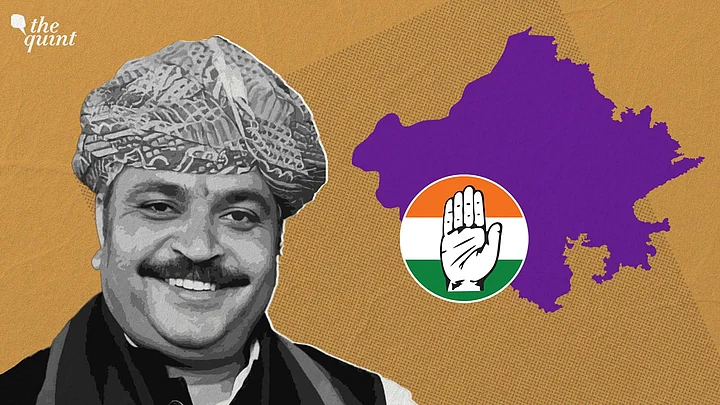The intersection of religion, politics, and education has suddenly taken center stage in Rajasthan. As controversies over wearing the Hijab and enforcing Surya Namaskar (salutation to the sun) in schools escalate, the Bharatiya Janata Party (BJP) seems keen to push a Hindutva agenda barely a few weeks after returning to power in India’s largest state.
While governance under Chief Minister Bhajan Lal Sharma has so far seen no striking success, political posturing over ticklish issues is peaking before the Lok Sabha elections looming ahead.
A Lesson In Communalism
The tranquil classrooms of Rajasthan have become battlegrounds the past week, echoing a sharp clash of ideologies and identities.
The collision is boiling over on the Hijab Row ignited by BJP MLA Balmukund Acharya's objection to Muslim students wearing hijabs at a school in Jaipur’s Walled City area.
In a video of Acharya’s visit to a government school for Republic Day celebrations, the MLA is seen questioning the dress code and pulling up a school official over some students wearing the hijab.
In another video, the Hawa Mahal MLA asks school authorities to stop students from wearing the hijab in school, which has a healthy mix of Hindu and Muslim kids.
In a video that surfaced afterwards, he is seen on stage, leading the students in chants of "Bharat Mata Ki Jai” and "Saraswati Mata Ki Jai”. It also shows Acharya walking through the school and prompting students to chant "Jai Shri Ram”.
Later, Muslim students and their guardian protested at the local police station, demanding that Acharya should be stopped from "vitiating the atmosphere in schools” and must apologise for his actions. As one student recalled, “He asked us to raise religious slogans and when some girls remained silent, he asked whether they were instructed to do so. He also said wearing hijab in school is not allowed."
Another student queried pertinently, "He wears a saffron robe to the Assembly. So why this discrimination against the hijab?” Though the protesting students left after a compromise was effected by the police, this row seems set to escalate in the coming days.
Food and Now Clothing, Acharya’s Hardline Stance
Acharya’s defence of his position is revealing. "I had asked the principal if they have two different dress codes. When a Republic Day function or any government function is held, is there a different dress code? At this rate, even our children will turn up in lehenga-chunni,'' he asserted.
In addition, Acharya remarked. “Why are there two types of dress codes in schools? I did not go to Madrasas and ask them to change their dress."
Ever since he won the Hawa Mahal seat in December, Acharya has shown a penchant for controversy.
Within hours of his narrow electoral win, he visited non-vegetarian shops and meat-selling vendors in the area and threatened them with consequences if they lacked necessary licenses. His anti-meat tirade was in sync with his countless statements to polarise voters during his poll campaign that was built around the need for upkeep of Hindu temples which he claimed were being damaged due to 'appeasement politics’ of the Congress.
The anti-hijab effort by the Saffron-robed MLA seems another attempt to bolster his image as a Hindutva hardliner.
Political Reactions on the Hijab Row
Inevitably, the hijab issue has kicked up a political storm. Congress MLA from Kishanpole, Amin Kagzi, accuses Acharya of trying to ruin communal harmony in the Walled City and warns that “if no action is taken by 2 February, the protests will begin again.”
Similarly, Congress MLA from Jaipur’s Adarsh Nagar, Rafeek Khan says, “Acharya is doing all this for cheap publicity…He should understand that he is not an MLA of a single political party but of all castes and religions….Rajasthan is known for its Ganga Jamuni tehzeeb (communal amity) and such things will not be tolerated.”
While the row simmers, senior BJP ministers have jumped to Acharya’s defence, suggesting a larger game plan.
Claiming that hijab is a 'symbol of slavery’ brought in by the Mughals, Agriculture Minister Kirodi Lal Meena asserted, “Hijab is not allowed in some Islamic nations. It should not happen here.” He added that "due to fanaticism (dharm ki kattarta) in the Muslim community and appeasement politics by the Congress, the community has not been able to progress. They have a lack of education. The dress code in schools should be followed.”
Similarly, Education Minister, Madan Dilawar, an RSS-backed leader says that, “schools in Rajasthan will soon have a dress code.”
In effect, without overtly imposing it, the ministers are verily endorsing a Hijab ban in Rajasthan.
A Saffron Shadow in Mandating Surya Namaskar in Schools
The Hijab row comes just days after another controversial move – to make 'Surya Namaskar' compulsory in schools across the state. The Rajasthan government has recently mandated that all schools, government and private, should practice Surya Namaskar till 15 February when on the occasion of Surya Saptami, the Education Department plans to create a world record.
Education minister Dilawar says that Surya Namaskar will initially be held during morning prayers and a decision to continue the same after the slated day will soon be taken.
A directive of the Education Department says Yoga experts will train students for Surya Namaskar. On Surya Saptami, besides students and teachers, parents of students, villagers, and officials will join the effort. The government claims this move will improve the educational environment in schools and strengthen the mental and physical fitness of students.
Social activists and human rights workers, however, point out that Surya Namaskar often involves prayers and chanting of mantras. As such, the order has alarmed many in schools run by minorities like the Muslim community and Christian missionary schools.
These groups argue that the move is 'divisive’ to the secular credentials of our nation. Many teachers say that instead of Surya Namaskar, the government should prioritise improving the quality of education and hiring more teachers.
A Concerted Effort for Religio-Cultural Streamlining of Non-Hindus
Significantly, BJP leaders are framing the debate over the seemingly innocuous issues of Hijab and Surya Namaskar as moves to defend modernity and uniformity. But to critics, they seem potent means to impose cultural homogeneity with a dominant Hindu identity.
In particular, the Hijab Row is not just about a dress code but also taps into deep-seated anxieties among some Hindus who perceive Muslim symbols as threats to their cultural dominance. Similarly, imposing Surya Namaskar, a yoga routine with Hindu religious elements, on students of all faiths seems a subtle bid to marginalise non-Hindus and create a climate of fear and exclusion.
Moves like the Hijab Row and Surya Namaskar seem a clever ploy to push a Hindutva agenda, polarise the electorate, and secure easy votes without any accountability for the Modi government’s record on real issues of education, health, and employment! No wonder, the observers of Rajasthan politics see these squabbles as an interplay of Hindutva ideology, social divisions, and a quest for votes in the Lok Sabha polls.
While the BJP projects itself as a defender of Hindu identity and culture, the state's governance under new Chief Minister Bhajan Lal Sharma has hardly seen a sparkling start.
Political circles are buzzing that by raking up divisive socio-religious issues, the Saffron brigade is diverting public attention away from the government's shortcomings.
In the recent Rajasthan elections, polarising politics was a critical factor for the BJP’s win. Now, the Bhajan Lal dispensation needs to defend all 25 Lok Sabha seats in the state which the BJP won in the 2014 and 2019 polls.
(The author is a veteran journalist and expert on Rajasthan politics. Besides serving as a Resident Editor at NDTV, he has been a Professor of Journalism at the University of Rajasthan in Jaipur. He tweets at @rajanmahan. This is an opinion piece. The views expressed above are the author’s own. The Quint neither endorses nor is responsible for them.)
(At The Quint, we question everything. Play an active role in shaping our journalism by becoming a member today.)




